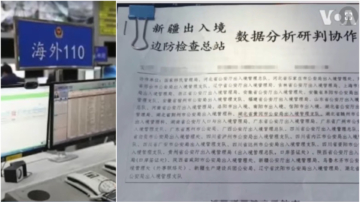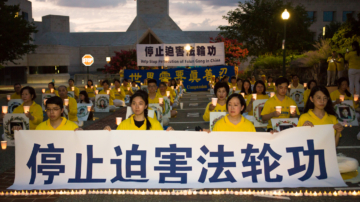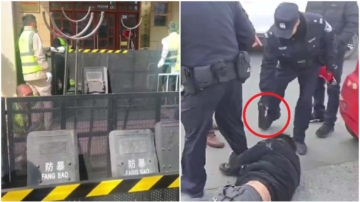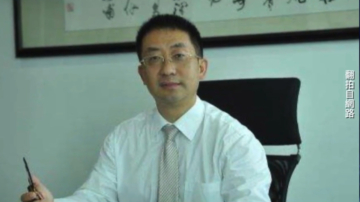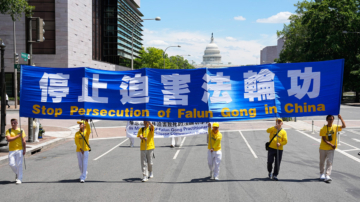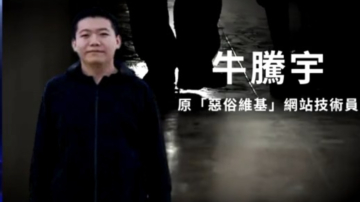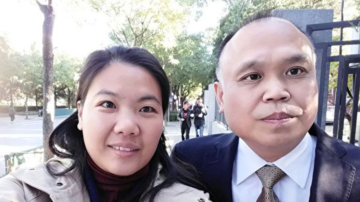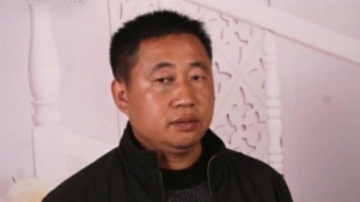【新唐人2014年06月21日讯】中国三名要求官员公示财产的活跃人士,被称为“新余三君子”的刘萍、魏忠平和李思华,6月19号被江西省新余市渝水区法院以“寻衅滋事”等罪名,分别判处6年半和3年的有期徒刑。“新余三君子”到底做了甚么罪而被中共重判呢?请看以下报导。
中国三名要求官员公示财产的活跃人士,被称为“新余三君子”的刘萍、魏忠平和李思华,6月19号被江西省新余市渝水区法院以“寻衅滋事”等罪名,分别判处6年半和3年的有期徒刑。“新余三君子”到底做了甚么罪而被中共重判呢?请看以下报导。
去年4月,江西新余市民刘萍、魏忠平、李思华被拘捕时,被指控“煽动颠覆国家政权罪”,到正式逮捕时改控“非法集会罪”,到法庭上又改成了“寻衅滋事罪”、和“聚众扰乱公共秩序罪”、“利用邪教组织破坏法律实施罪”等。
可是,法庭在9500字的判决书中,始终没有提及“三君子”他们是如何“寻衅滋事”和“聚众扰乱公共秩序”。
其实,“三君子”只是一起在房前公开展示了标语,一幅是“人民代表人民选!公民精神万岁”,另一幅则是写着“强烈要求官员财产公开”。
面对如此荒唐的当局,魏忠平在法庭最后陈述中怒吼:“我本应该站在原告席上,去控告这些滥用权力的人。”
大陆律师郑建伟:“我认为他们是无罪的。有罪、无罪,我们评判的就是对社会有没有危害嘛,他们的哪一件事情对社会造成危害,危害到哪一集体的人,他(们)危害的是谁?”
刘萍的律师斯伟江对英国《路透社》说,判决“既不公平,也不公正”。他表示,在政治案件中,“政府希望有甚么样的结果,法庭就作出怎样的判决。”
国际人权组织“大赦国际”在一份声明中强烈谴责这次的判决,并认为“荒谬可笑”。“大赦国际”中国问题研究员威廉•尼说,“小型私人集会,在大楼门厅前打出标语要求公示官员财产,无论如何也构不成“寻衅滋事”以及“非法集会”。”
其实,刘萍等人要求官员公布财产触痛了中共。
2010年,国务院研究室、和中纪委、及中国社会科学院,合作完成的《全国地方党政部门、国家机关公职人员薪酬和家庭财产调查报告》显示,131万中国县团级以上官员及其家属占有全民财富的80%,到2010年6月底全国个人储蓄存款达75200亿元,其中县、团、处级以上官员(包括离退休)及其家属的个人储蓄占40000亿元﹔股市证券市场中60000亿元,干部及其家属也是占了45000亿元。
刘萍是下岗工人,她曾在2011年参选人大代表,当年她曾组织网友强闯山东东师古村探望盲人维权人士陈光诚。她还赴乌坎支持村民“维权”。
中国浙江异议作家陈树庆:“她的行为冲击了现有的体制,说白了就是冲击了中共权贵们的政治特权、整个社会其他特权。”
中国浙江异议作家陈树庆指出,刘萍敢于说真话,所以中共非常害怕。
北京社维权人士胡佳:“重判他们的目地仍然是当局惯用的震慑维稳的手段,而且你也可以看到,就是今年的6.4对当局的挑战满大的,它们其实是相当恐慌的。”
北京社维权人士胡佳表示,中共当局今年想通过震慑老百姓来“维稳”,一开始就对维权人士许志永、丁家喜等人判刑。但仍有很多中国百姓去建三江、和曲阜等地声援。
胡佳:“这种重判只会激发起更多的人对这个体制的反感,对这个体制的不满,对这个体制的彻底的绝望。”
最近,香港人为了争取特首普选,发起“全民公投”活动,但民意调查的普选投票网站,遭到疑似来自中国100亿人次的骇客攻击,造成网站瘫痪。
香港《蘋果日报》的评论指出,在中共当局眼中,无论在香港、在内地,公民要求行使选举权,就是对中共统治权的挑衅,就是颠覆国家政权,因此疯狂打压、不择手段。
新余法院开庭当天,拒绝刘萍的女儿和母亲旁听,当地多名维权人士被“喝茶”和失踪。而成功到达新余的十几名维权人士中,刘向阳、孙涛、杨崇等人则被抓。
采访/朱智善 编辑/宋风 后制/陈建铭
Why have Xingyu Activists Receive Heavy Sentences?
The three Xingyu activists, Liu Ping, Wei Zhongping,
and Li Sihua, were sentenced over the crime of provocation
on June 19.
Yushui District court of Xingyu City ruled,
six and a half years and three years imprisonment.
What have the three activists done to deserve
such heavy sentences?
The following is our report.
In April last year, Liu Ping, Wei Zhongping, and Li Sihua,
three activists from Xinyu City, Jiangxi Province, were first
accused of inciting subversion of state power.
They were arrested on unlawful assembly, which was changed to
provocation, gathering people to disturb public order and
crimes of sabotaging legal enforcement by organizing and
using evil religion, in court.
However, within the 9,500 words of the court's verdict,
nothing about how they have picked on, quarreled or disturbed
public order were mentioned.
In fact, the three of them were only displaying banners stating,
"Representatives ought to be elected!
Long live the civil spirit," and "Strongly demand official
property declaration" in front of their home.
Faced with such absurd authorities, Wei Zhongping roared
in the end of his statement in court: I should have taken
the plaintiff's chair and accused those who abused power.
Zheng Jianwei, lawyer: I don't think they're guilty.
Guilty or not is based on whether or not they have caused
any damage to the society, what have they done to cause
the damage, and who are the victims of the damage.
Si Weijiang, Liu's lawyer to Reuters: It isn't fair,
it isn't just.
The laws can just be bent however the government
wants it in politicized cases.
Amnesty International issued a statement condemning
the heavy sentences of the three activists.
William Nee, Amnesty International's China Researcher:
The charges against these activists were preposterous.
Having a small private gathering and holding a banner in a
lobby entrance demanding financial transparency from officials
should not in any way constitute "picking quarrels"
and "illegal assembly."
In fact, the demand of publicizing official wealth has touched
the CCP's tender spot.
A 2010 survey by the State Council Research Office,
the Central Discipline Inspection Commission, and the Chinese
Academy of Social Sciences compiled data of 1.31 million
governmental official wealth.
The data showed these officials occupied 80% of
the national wealth.
In the national personal savings of 7.52 trillion yuan
(USD 1.2 trillion) by the end of June 2010, these officials'
personal savings were 4 trillion yuan (USD 640 billion).
In the total investment of 6 trillion yuan (USD 960) in the
stock market these officials again accounted
for 4.5 trillion yuan (USD 720 billion).
Liu Ping, as a laid-off worker, had intended to represent
laid-off workers in the 2011
National People's Congress election.
She had organized netizens to visit Shandong
blind activist Chen Guangcheng.
She also went to Wukan in support of the villagers' rights.
Chen Shuqing, Chinese dissident writer: Her acts were a shock
to the existing institution.
Frankly, it attacks the political privileges of the CCP
bigwigs and other privileges of the entire society.
Chen Shuqing Zhejiang indicates that Liu Ping's daringness
frightens the CCP.
Hu Jia, Beijing activist: The heavy sentence continues
to be the custom of the regime to threaten
and to maintain stability.
It is also clear that this June 4 has imposed great challenges
to the regime. They are in a panic.
Hu Jia says that the regime has posed heavy sentences
to activists Xu Zhiyong and Ding Jiaxi earlier this year.
Despite the threat and the maintenance of stability, many
Chinese continue to pay their solidarity
to Jiansanjiang and Qufu.
Hu Jia: This type of heavy sentence will only
disgust more people.
Many more will get dissatisfied and totally disappointed
by the system.
Recently, the unofficial universal suffrage in Hong Kong was
subject to 10 billion hacker attacks suspected from China.
The online voting system was subsequently crashed.
Hong Kong's Apple Daily commented that in the eyes
of the Communist authorities, any demand of right to vote
in Hong Kong or mainland is to challenge the ruling CCP,
is to subvert state power, and thus be subjected
to unscrupulous suppression.
On the day of the Xinyu court hearing, Liu Ping's daughter
and mother were refused to attend, while many local activists
were "having tea" and disappeared.
More than a dozen activists made it successfully to Xinyu.
Among them, Liu Xiangyang, Sun Tao and
Yang Chong were arrested.
Interview/ZhuZhiShan Edit/SongFeng Post-Production/ChenJianMing
中国三名要求官员公示财产的活跃人士,被称为“新余三君子”的刘萍、魏忠平和李思华,6月19号被江西省新余市渝水区法院以“寻衅滋事”等罪名,分别判处6年半和3年的有期徒刑。“新余三君子”到底做了甚么罪而被中共重判呢?请看以下报导。
去年4月,江西新余市民刘萍、魏忠平、李思华被拘捕时,被指控“煽动颠覆国家政权罪”,到正式逮捕时改控“非法集会罪”,到法庭上又改成了“寻衅滋事罪”、和“聚众扰乱公共秩序罪”、“利用邪教组织破坏法律实施罪”等。
可是,法庭在9500字的判决书中,始终没有提及“三君子”他们是如何“寻衅滋事”和“聚众扰乱公共秩序”。
其实,“三君子”只是一起在房前公开展示了标语,一幅是“人民代表人民选!公民精神万岁”,另一幅则是写着“强烈要求官员财产公开”。
面对如此荒唐的当局,魏忠平在法庭最后陈述中怒吼:“我本应该站在原告席上,去控告这些滥用权力的人。”
大陆律师郑建伟:“我认为他们是无罪的。有罪、无罪,我们评判的就是对社会有没有危害嘛,他们的哪一件事情对社会造成危害,危害到哪一集体的人,他(们)危害的是谁?”
刘萍的律师斯伟江对英国《路透社》说,判决“既不公平,也不公正”。他表示,在政治案件中,“政府希望有甚么样的结果,法庭就作出怎样的判决。”
国际人权组织“大赦国际”在一份声明中强烈谴责这次的判决,并认为“荒谬可笑”。“大赦国际”中国问题研究员威廉•尼说,“小型私人集会,在大楼门厅前打出标语要求公示官员财产,无论如何也构不成“寻衅滋事”以及“非法集会”。”
其实,刘萍等人要求官员公布财产触痛了中共。
2010年,国务院研究室、和中纪委、及中国社会科学院,合作完成的《全国地方党政部门、国家机关公职人员薪酬和家庭财产调查报告》显示,131万中国县团级以上官员及其家属占有全民财富的80%,到2010年6月底全国个人储蓄存款达75200亿元,其中县、团、处级以上官员(包括离退休)及其家属的个人储蓄占40000亿元﹔股市证券市场中60000亿元,干部及其家属也是占了45000亿元。
刘萍是下岗工人,她曾在2011年参选人大代表,当年她曾组织网友强闯山东东师古村探望盲人维权人士陈光诚。她还赴乌坎支持村民“维权”。
中国浙江异议作家陈树庆:“她的行为冲击了现有的体制,说白了就是冲击了中共权贵们的政治特权、整个社会其他特权。”
中国浙江异议作家陈树庆指出,刘萍敢于说真话,所以中共非常害怕。
北京社维权人士胡佳:“重判他们的目地仍然是当局惯用的震慑维稳的手段,而且你也可以看到,就是今年的6.4对当局的挑战满大的,它们其实是相当恐慌的。”
北京社维权人士胡佳表示,中共当局今年想通过震慑老百姓来“维稳”,一开始就对维权人士许志永、丁家喜等人判刑。但仍有很多中国百姓去建三江、和曲阜等地声援。
胡佳:“这种重判只会激发起更多的人对这个体制的反感,对这个体制的不满,对这个体制的彻底的绝望。”
最近,香港人为了争取特首普选,发起“全民公投”活动,但民意调查的普选投票网站,遭到疑似来自中国100亿人次的骇客攻击,造成网站瘫痪。
香港《蘋果日报》的评论指出,在中共当局眼中,无论在香港、在内地,公民要求行使选举权,就是对中共统治权的挑衅,就是颠覆国家政权,因此疯狂打压、不择手段。
新余法院开庭当天,拒绝刘萍的女儿和母亲旁听,当地多名维权人士被“喝茶”和失踪。而成功到达新余的十几名维权人士中,刘向阳、孙涛、杨崇等人则被抓。
采访/朱智善 编辑/宋风 后制/陈建铭
Why have Xingyu Activists Receive Heavy Sentences?
The three Xingyu activists, Liu Ping, Wei Zhongping,
and Li Sihua, were sentenced over the crime of provocation
on June 19.
Yushui District court of Xingyu City ruled,
six and a half years and three years imprisonment.
What have the three activists done to deserve
such heavy sentences?
The following is our report.
In April last year, Liu Ping, Wei Zhongping, and Li Sihua,
three activists from Xinyu City, Jiangxi Province, were first
accused of inciting subversion of state power.
They were arrested on unlawful assembly, which was changed to
provocation, gathering people to disturb public order and
crimes of sabotaging legal enforcement by organizing and
using evil religion, in court.
However, within the 9,500 words of the court's verdict,
nothing about how they have picked on, quarreled or disturbed
public order were mentioned.
In fact, the three of them were only displaying banners stating,
"Representatives ought to be elected!
Long live the civil spirit," and "Strongly demand official
property declaration" in front of their home.
Faced with such absurd authorities, Wei Zhongping roared
in the end of his statement in court: I should have taken
the plaintiff's chair and accused those who abused power.
Zheng Jianwei, lawyer: I don't think they're guilty.
Guilty or not is based on whether or not they have caused
any damage to the society, what have they done to cause
the damage, and who are the victims of the damage.
Si Weijiang, Liu's lawyer to Reuters: It isn't fair,
it isn't just.
The laws can just be bent however the government
wants it in politicized cases.
Amnesty International issued a statement condemning
the heavy sentences of the three activists.
William Nee, Amnesty International's China Researcher:
The charges against these activists were preposterous.
Having a small private gathering and holding a banner in a
lobby entrance demanding financial transparency from officials
should not in any way constitute "picking quarrels"
and "illegal assembly."
In fact, the demand of publicizing official wealth has touched
the CCP's tender spot.
A 2010 survey by the State Council Research Office,
the Central Discipline Inspection Commission, and the Chinese
Academy of Social Sciences compiled data of 1.31 million
governmental official wealth.
The data showed these officials occupied 80% of
the national wealth.
In the national personal savings of 7.52 trillion yuan
(USD 1.2 trillion) by the end of June 2010, these officials'
personal savings were 4 trillion yuan (USD 640 billion).
In the total investment of 6 trillion yuan (USD 960) in the
stock market these officials again accounted
for 4.5 trillion yuan (USD 720 billion).
Liu Ping, as a laid-off worker, had intended to represent
laid-off workers in the 2011
National People's Congress election.
She had organized netizens to visit Shandong
blind activist Chen Guangcheng.
She also went to Wukan in support of the villagers' rights.
Chen Shuqing, Chinese dissident writer: Her acts were a shock
to the existing institution.
Frankly, it attacks the political privileges of the CCP
bigwigs and other privileges of the entire society.
Chen Shuqing Zhejiang indicates that Liu Ping's daringness
frightens the CCP.
Hu Jia, Beijing activist: The heavy sentence continues
to be the custom of the regime to threaten
and to maintain stability.
It is also clear that this June 4 has imposed great challenges
to the regime. They are in a panic.
Hu Jia says that the regime has posed heavy sentences
to activists Xu Zhiyong and Ding Jiaxi earlier this year.
Despite the threat and the maintenance of stability, many
Chinese continue to pay their solidarity
to Jiansanjiang and Qufu.
Hu Jia: This type of heavy sentence will only
disgust more people.
Many more will get dissatisfied and totally disappointed
by the system.
Recently, the unofficial universal suffrage in Hong Kong was
subject to 10 billion hacker attacks suspected from China.
The online voting system was subsequently crashed.
Hong Kong's Apple Daily commented that in the eyes
of the Communist authorities, any demand of right to vote
in Hong Kong or mainland is to challenge the ruling CCP,
is to subvert state power, and thus be subjected
to unscrupulous suppression.
On the day of the Xinyu court hearing, Liu Ping's daughter
and mother were refused to attend, while many local activists
were "having tea" and disappeared.
More than a dozen activists made it successfully to Xinyu.
Among them, Liu Xiangyang, Sun Tao and
Yang Chong were arrested.
Interview/ZhuZhiShan Edit/SongFeng Post-Production/ChenJianMing

